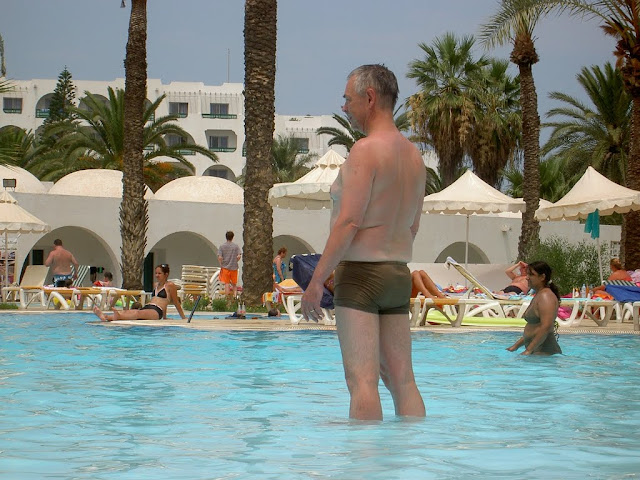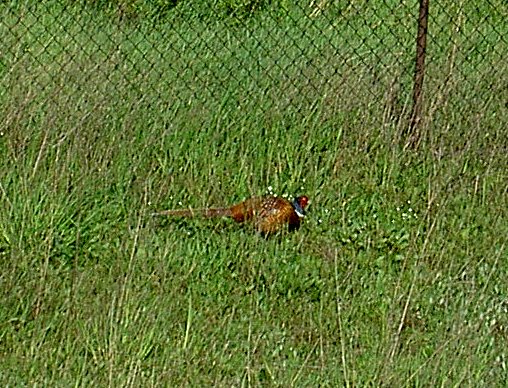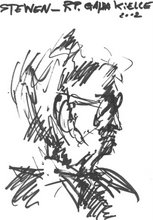Amongst all the other things I have been contemplating, I wanted to write something about how to drive on snowy roads for those who have never done so before. The basic rule in London was: don't. Use public transport if there is any. I vaguely remember the unusual event of snow on Christmas day, when I was driving to my Mum's, and it all worked out okay, but I equally remember the car sliding on a road in Wales and smashing much of the left-hand side. However, a post on '
The Streets Are Black' at Kielbasa Stories has given me a different focus. Chris there writes about the city experience. I can show something of country life.

There's no escaping it in Poland. The above picture was taken during the first heavy snow fall back in late November - you might just make out the snow falling against the background of the fence. We have had perhaps 50cm of snow altogether, although we some melting and compacting it is now less than 10cm in undisturbed areas - just a few centimetres in water content (precipitation), I guess. The description of the roads below therefore shows what you can expect during a fairly clear period. The story is much different during and immediately after snowfall.

The last few days has had some periods of light snowfall, dull dry periods and some sun. The freezing fog banks gathering in the above picture were taken driving just around the corner from home.
The first few times of snow driving were gut-wrenchingly nerve racking. I had to deal with the car happily moving sideways without any interference on my part. I have pretty much got used to it now, although I probably remain more conscious of it than Polish drivers.
The best quality roads are the national highways, which are snow ploughed and salted/gritted, whatever, although I did hear at a seminar once that this is only effective down to about 8c. In the picture below, the main road from Warsaw to Katowice is almost completely clear of snow and ice, which can be compared to the access lane quality. 90 kilometres per hour (kmph) is quite safe on the main road at the moment, at least on fairly straight stretches. Few people drive above the 100kmph speed limit and there is much less reckless driving than in the summer.

Driving along on the Katowice Road during snow fall, you can come across three snow ploughs stretch across the compete carriageway, clearing the whole thing in one go. The effort (and national budget funded expense) put into this, compares with lower level local authority roads, Gminas. Nadarzyn, technically a village, but better thought of as the small town centre of the Gmina, maintains its reasonably busy bus route as shown below. Going at about 50kmph, the legal maximum, is quite standard here.

Getting into the villages, Rusiec's old village centre road is snow ploughed, but the low level of car traffic has left much more snow. There are sharp corners at the end and the road is too narrow to pass other cars at speed, so its generally 20kmph unless the road is clear enough to go up to 30kmph. The road humps here advise 30 kmph, but it gives a bad wack to the suspension above 20 kmph anyway. The road is not very long and I don't have the Polish habit of giving maximum acceleration and then slamming the breaks on a few seconds later. I also change down a gear to brake, which ensures I have no loss of traction going into a turn, but which gives me a much longer distance slowing down, so going fast is pretty pointless. 40 kmph on an empty part of the road is probably safe.

There are plenty of unmade roads here. You can just see the change of colour on the road in roughly the middle picture, where the made road ends. It is very stony and dusty or muddy without the snow, and there is probably little difference in the speed you can drive, not that I've been down it in the snow.

From Rusiec, the road below to Belina Estate is very quiet and is more often used going towards Rusiec, hence the wheel lines are on the left hand side of the road. This is only roughly snow ploughed, so there is quite a thick layer of condensed snow. It is here that the car wanders about most, taking you into the tyre tracks, whether you want to or not. 20 kmph when passing cars and at the bends, but 40kmph is fine, whilst, if I had the courage to try, 50kmph might be OK.

Then a right turn into a road which is clearer. Although its not a bus route, I think its part of a circular route around Rusiec, given priority by the Gmina. The road turning left heads into Belina Estate.

The Estate road hasn't been cleared at all and is just compacted. Even so, you can just about see the road surface underneath in some places. The piles of snow are from people clearing their drives.

And then the sun came out, so a picture of the road through Młochów, with the bus stop on the left.

Today is a beautiful sunny day, with the diamonds glittering their white, red and blue in the snow. Although I clear my drive, the compacted snow where we have driven the cars is, contrary to all the other roads, the main place where the snow remains. It is much whiter than I would like, but a layer of snow after the short period of thaw has stuck to the ground. If that thaw comes next week...

So that's my complete guide to country roads. However, I was just taking Misia to school this morning and there, standing in the drive, was a male pheasant.
I mentioned pheasants in a previous post, when a female came into the garden. This male was closer to us than I had seen before, but we were sitting in the car and I only had time to take a quick snap through the windscreen.

What do pheasants eat?

































